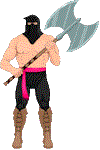What's a "Difficult Move" in FoG then?
Some troop types, well, how can I put it? Lets be polite and just say they probably missed the training sessions on "parade ground" drill - maybe they overslept, maybe they took extra classes in "get stuck in and smack the enemy about the head and body" instead, or maybe they are just a little bit thick. Who knows, but it does mean there are certain things - not much - they will find hard to do.
ALL Generals, Skirmishers, drilled troops, undrilled cavalry or undrilled light chariots, fall in the "we attended all our lessons" category and so they are the teachers pets.
This means they - and you - don't even need to know what "Difficult Moves" are. Its not their problem, never is, never will be. So if you are playing with these chaps, simply move along to the next page....
However this leaves the troops types who you would have found standing in the corner wearing the pointy hat with a big "D" on it after marching practice.
This list includes any and all of:
- undrilled medium or heavy foot,
- all elephants & all scythed chariots,
- undrilled knights,
- undrilled cataphracts,
- undrilled heavy chariots or
- undrilled battlewagons.
To be honest, being bracketed with the thicko's isn't all that bad.
The only real problem is that they almost always need to pass a CMT to move less than their full move straight ahead.
Now, re-read that carefully.
Full speed AND straight ahead.
So a short move is going to be a problem, and so is a full-speed move that includes a wheel.
There. That was fairly painless, wasn't it ?
Now, take a deep breath.... because we did say "almost always"...
There are only 3 times they won't need to pass a CMT to either move less than full speed or wheel.
These are:
- if they are getting orders direct from a general (he's with the battlegroup or battleline), as they try a lot harder to remember their lessons when the teacher is around
- if they are a long, long way away from any enemy (more than 6 MUs) as then they are too far away to have their concentration spoilt by enemy troops shouting abuse or making rude hand gestures.. (enemy generals don't count here - probably too busy shouting and gesturing at their own troops I suppose...)
- if they end up clattering into someone (in a charge or in a move to an overlap position). Well, of course, this one is stating the obvious ..
That's it.
...and relax......
Even more Pithily
To wheel AND/OR move less than full speed with:
- undrilled medium or heavy foot,
- Elephants
- Scythed chariots,
- undrilled knights,
- undrilled cataphracts,
- undrilled heavy chariots or
- undrilled battlewagons.
You must either
- have a general with you,
- be more than 6MU from any enemy, (enemy generals don't count)
- or pass a CMT
That's it.
Losing - or counting - dice?
- For shooting with troops who get less than 1 dice per base you only get one shooting dice for each complete set of X bases.
- For determing number of dice rolled by disordered, disrupted or fragged troops in combat you only lose one dice for every complete set of X dice.
- For casualty HPB calculations, you count the hits per complete OR part set of X bases.
More FoG links on this site:
- FoG Army Lists - lots of lists to try
- FoG Bookshop - buy history & wargaming books grouped by FoG Companions Army List Books
- FoG unit status markers available for for download
- To My Easy 15mm Hoplite Painting Guide
- To My Easy 15mm Generic Ancient Infantry Painting Guide
View My Stats

